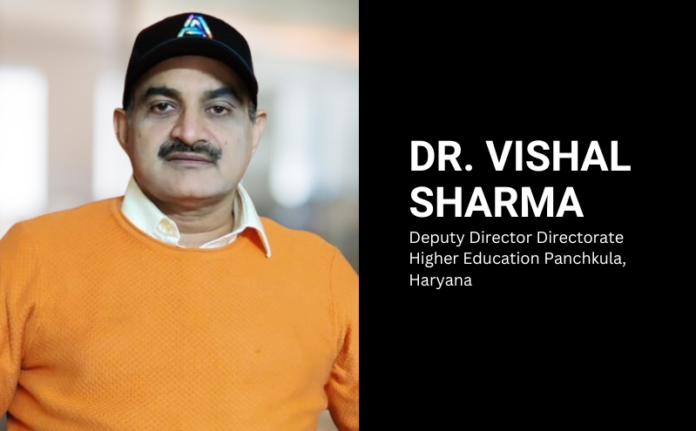Dr. Vishal Sharma, Ph.D., is a Deputy Director at the Directorate of Higher Education Sector’5, Panchkula, India. His exceptional contributions in the field of plant biotechnology have garnered international recognition and accolades.
He has been recognized as the “Environmentalist of the Year” by the National Environment Academy, Goa University, and esteemed environmentalists for his significant contributions to environmental sustainability and eco-restoration. Dr. Sharma’s achievements extend to winning the Gold in the Paris Design Award 2023 for Environment Sustainability.
Dr. Vishal Sharma’s unwavering commitment to research and sustainable development has cemented his position as a leader in the field. His remarkable achievements serve as an inspiration to others and contribute significantly to the pursuit of the United Nations Sustainable Development Goals.
Accolades and Recognition
Dr. Sharma’s exceptional journey is marked by a series of accolades and awards that highlight his significant contributions to environmental sustainability. His achievements include the “International Best Scientist Award in Plant Biotechnology,” the title of “Scientist of the Year 2019” at the International Conference on Agriculture, Horticulture, and Food Sciences, and the prestigious “66 Skoch Award” for his work in environmental sustainability and solid waste management. Additionally, the United Nations honored him with the “UN Sustainable Development Goals Action Award” in recognition of his outstanding contributions to environmental sustainability during 2020-2021.
Impact and Achievements
Dr. Sharma’s project has yielded remarkable results, particularly in the context of the COVID-19 pandemic. The production of organic compost from municipal solid waste has not only improved the quality and shelf life of flowers but has also resulted in significant financial savings. Through his innovative two-stage composting approach, Dr. Sharma has successfully mitigated 88% of carbon emissions, equivalent to 346.7 million tons of carbon dioxide, earning 346 carbon credits valued at around 8.71 lakhs in the global market. Furthermore, his initiatives have sparked an attitude shift towards solid waste management, leading to widespread at-source segregation practices and preventing the accumulation of mixed waste in landfills and composting plants.
Promoting Sustainability and Empowering Youth
Dr. Sharma’s efforts extend beyond tangible outcomes. He has organized mass awareness programs, reaching over fifty thousand stakeholders, to promote responsible waste management practices. Moreover, he has prioritized skill upgradation by providing training to girl students in the field of solid waste management, empowering them with practical knowledge and expertise. By fostering a cleaner and greener society, Dr. Sharma is creating a lasting impact on the environment and the mindset of individuals, ensuring a sustainable future for generations to come.
Recognitions and Awards
Dr. Vishal Sharma bagged United Nations (UN) Sustainable Development Goals (SDG) Action award in the Individual category (“Environment Sustainability”-2020-2021) and was recognized at the 26th International Congress of IFHE-International Award 2020 in Italy.
The project was also awarded as Innovative Environment Project by CII; 2021(8th edition) of National Awards for its Carbon footprint benefits.
Dr. Sharma’s project is shortlisted as one of the finalists of the United Nations Green Gown International Awards 2022 and 2023, a pioneer project from India and conferred Green Technology Innovative Awards-2022 at ICAR-IGFRI, Jhansi, Uttar Pradesh and also awarded “Green Technology Award 2022” in ESDA World Environment Summit(WES) organized by United Nations Environment Program(UNEP) with Ministry of Environment and Climate Change, GOI, New Delhi on October 16, 2022.
Dr. Sharma was conferred with the “Environmentalist of the Year Award” at, Goa University. Dr. Sharma won the Gold in Paris Design Award-2023 and GOV Design Awards 2023 for Windrow Composting Plant designs.
Groundbreaking Project in Solid Waste Management
In 2019, Dr. Sharma embarked on a groundbreaking project in solid waste management, aiming to find sustainable solutions for managing municipal solid waste (MSW). His project focused on achieving decarbonization and creating a “Sustainable Zero Waste Future” for the cities of Chandigarh and Panchkula. By implementing a two-stage windrow composting approach and optimizing various physicochemical parameters, Dr. Sharma aimed to produce stabilized compost suitable for agronomic practices. His project has already prevented significant carbon dioxide emissions, produced organic compost, and garnered tangible benefits for farmers and the environment.
Overcoming Challenges
The most challenging aspects of the journey so far have been:
- Solid waste auditing: Conducting a thorough analysis of solid waste was crucial in designing an effective composting strategy, including layout design, sizing, and capacity determination.
- Segregation: Overcoming the challenge of proper waste segregation at the source was essential to ensure that composting processes were not hindered and to reduce greenhouse gas emissions.
- Household composting: Changing the perception that composting is smelly and attracts pests proved to be a significant obstacle in promoting household composting practices.
- Financial constraints: Addressing the financial limitations was crucial, which was achieved by implementing low-cost windrow composting techniques and manually turning the compost at specific intervals.
- Designing the windrow plant: Balancing the economic considerations and land utilization while designing the windrow composting facility posed a challenge that required careful planning and optimization.
- Standardizing compost monitoring: Establishing standardized protocols for monitoring physico-chemical parameters such as temperature, pH, moisture content, electrical conductivity, and C/N ratio was necessary to ensure the production of compost suitable for floriculture and landscaping operations.
These challenges were overcome through diligent research, practical solutions, community engagement, and continuous improvements in the composting processes.
The obstacles they are currently working through include:
ENVIRONMENTAL CONDITION INDICATOR (ECI)
- Microclimate: The optimization of the institute climate in comparison to the city due to a reduction in greenhouse gases. This microclimate is beneficial for students of the institute and makes their stay pleasant and comfortable.
- Solid Waste Management: The waste generated compost through windrow composting makes the institute fully organic and helped the institute to bag “Best Maintained Campus” at the Regional, National, and International level, these third parties confirmation is the management performance indicator.
- Low GHGs Emission: The single and two-stage windrow composting reduces carbon dioxide emission by 74% and 88% respectively and contributes to the prevention of environmental global problems like global warming, Ozone depletion if studies are replicated at the National level.
- Scalability: The case study is already replicated in two secondary institutes and the reproducibility of results confirms the study’s adaptability. Reduce dumping sites and landfills: The segregation at source and windrow composting reduces dumping sites and landfills on the campus. This results in GHG reduction and provides clean and pleasant sight to the Human eye.
Vision
Their vision is to promote the best organic waste management strategy through the co-composting of food, green, and fruit waste, resulting in significant carbon footprint reduction. By evaluating and optimizing physico-chemical parameters, such as temperature, moisture content, pH, electrical conductivity, and C:N ratio, they aim to produce stabilized compost suitable for agronomic practices. Through their two-stage windrow composting approach, they strive to prevent carbon cycle interruptions and minimize the negative environmental impact of traditional pit composting. Their project has already prevented 346.7 metric tons of carbon dioxide emissions and produced 564 quintals of organic compost annually. Recognized with prestigious awards, including the United Nations Sustainable Development Goals (SDG) Action award and the Innovative Environment Project award, they are committed to achieving a greener and more sustainable future.
In the next 10 or 25 years, he envisions himself at the forefront of sustainable waste management and environmental stewardship. Building upon the success of the present project, he aims to further refine and optimize the composting process by closely monitoring physico-chemical parameters and implementing life cycle assessments. By employing a membrane-covered windrow composting system, he seeks to accelerate microbial degradation, reduce greenhouse gas emissions, and mitigate odor emissions. Through these efforts, he hopes to address the challenges associated with unscientific landfilling, disease transmission, and the depletion of precious resources like farmyard manure.
Embracing the concept of circular economy, he aspires to transform waste-to-energy practices, leading to carbon footprint reduction and climate change mitigation. By promoting the use of organic compost in agriculture, he anticipates increased crop yields and protection against pesticide and weedicide bio-magnification. These contributions to sustainable development and the well-being of our planet align with the long-term goals of our nation.
Reproducibility and Scalability: A Key to Global Success and Carbon Reduction
This study’s remarkable success lies in its reproducibility and scalability, enabling its implementation in various locations worldwide. The technology employed has already generated 346 carbon credits in two secondary institutes, promoting global carbon mitigation with an 88% reduction in carbon footprints. Additionally, the study has produced 564 quintals of organic compost, leading to the recognition of the institute’s campus as the Best Maintained Campus in multiple Rose Festival editions. The utilization of waste-generated compost showcases an exemplary “Best of Waste” and “Waste to Wealth” scenario.
Conclusion
Dr. Vishal Sharma’s pioneering work in solid waste management stands as a testament to his dedication, innovation, and commitment to creating a sustainable future. His remarkable achievements recognized both nationally and internationally, have revolutionized the field and inspired countless individuals to embrace responsible waste management practices. Through his project, Dr. Sharma is not only mitigating carbon emissions and preserving valuable resources but also empowering youth and transforming mindsets. With his continued efforts and leadership, the cities of Chandigarh and Panchkula are on the path to becoming shining examples of environmental sustainability and resilience.




